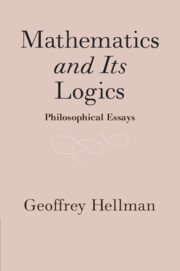Book contents
- Mathematics and Its Logics
- Mathematics and Its Logics
- Copyright page
- Contents
- Acknowledgements
- Introduction
- Part I Structuralism, Extendability, and Nominalism
- Part II Predicative Mathematics and Beyond
- Part III Logics of Mathematics
- 11 Logical Truth by Linguistic Convention
- 12 Never Say “Never”!
- 13 Constructive Mathematics and Quantum Mechanics: Unbounded Operators and the Spectral Theorem
- 14 If “If-Then” Then What?
- 15 Mathematical Pluralism: The Case of Smooth Infinitesimal Analysis
- Index
- References
13 - Constructive Mathematics and Quantum Mechanics: Unbounded Operators and the Spectral Theorem
from Part III - Logics of Mathematics
Published online by Cambridge University Press: 26 January 2021
- Mathematics and Its Logics
- Mathematics and Its Logics
- Copyright page
- Contents
- Acknowledgements
- Introduction
- Part I Structuralism, Extendability, and Nominalism
- Part II Predicative Mathematics and Beyond
- Part III Logics of Mathematics
- 11 Logical Truth by Linguistic Convention
- 12 Never Say “Never”!
- 13 Constructive Mathematics and Quantum Mechanics: Unbounded Operators and the Spectral Theorem
- 14 If “If-Then” Then What?
- 15 Mathematical Pluralism: The Case of Smooth Infinitesimal Analysis
- Index
- References
Summary
A major outstanding issue in the foundations and philosophy of mathematics concerns the indispensability of classical infinitistic mathematics for the empirical sciences. Claims of such indispensability form a modern cornerstone of mathematical platonism and alternative classical realist conceptions as well (e.g. modal structuralism) (cf. e.g., Quine [1953], Putnam [1967, 1971], and Hellman [1989a]). This has posed a corresponding challenge to constructivist views (intuitionistic, Bishop-constructivist [Bishop 1967], and related approaches). How much of the mathematics actually employed in the empirical sciences, especially physics, can be carried out constructively (in the various relevant senses)? It is probably no exaggeration to say that the viability of a constructivist philosophy of mathematics is here at stake (cf. Burgess [1984]).
- Type
- Chapter
- Information
- Mathematics and Its LogicsPhilosophical Essays, pp. 212 - 236Publisher: Cambridge University PressPrint publication year: 2021



